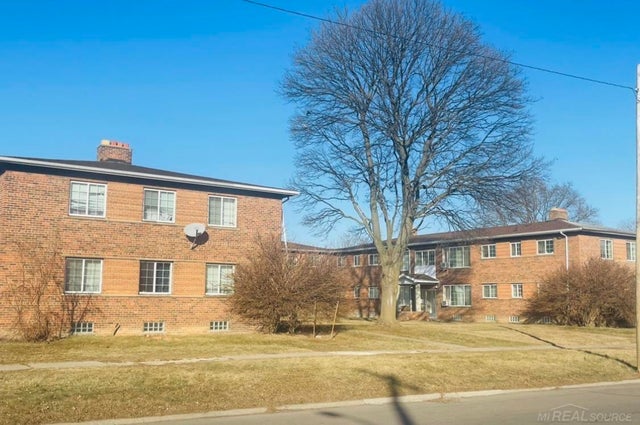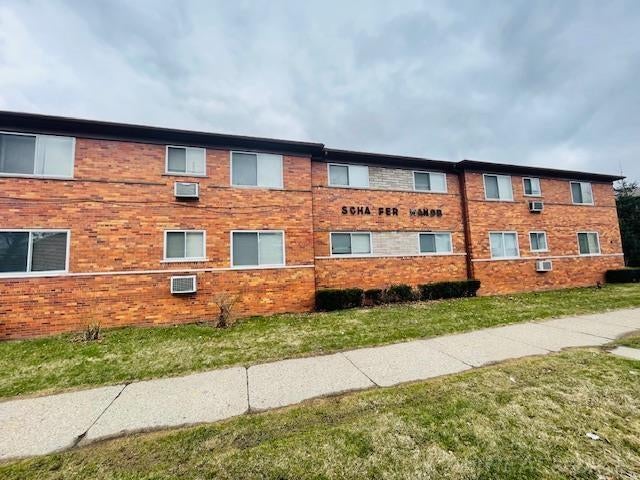In a quiet Lenawee County neighborhood about an hour outside Detroit, an unusual greeting has become the norm: “How’s it smelling down by your house?” For residents of Adrian’s east side, this isn’t a joke. It’s a reality born of a persistent “rotten egg” stench that has plagued their town for years. Neighbors swap stories of dashing from car to front door to escape the foul odor, likening the smell to “organic death” or “a dead animal carcass” in the yard. It sounds almost comical, but for families who’ve lived here for generations, the situation is anything but funny.
This long-running odor saga centers on a local factory that turns bad eggs into pet food. Yes, you read that right, powdered eggs destined for Fido’s kibble. The smell has gotten so bad that summer barbecues are canceled, windows stay shut even on breezy days, and some folks genuinely wonder if there’s a sewer backup in their home. After years of complaints, half-measures, and holding their noses, residents are pinning their hopes on a new class-action lawsuit to finally breathe fresh air again. This is the story of Adrian’s infamous rotten egg smell, how it started, what’s been done, and whether legal action might finally clear the air.
 Veos, Facebook
Veos, Facebook
What’s Causing the ‘Rotten Egg’ Stink in Adrian?
The source of the odor is a red-brick industrial plant on East Maumee Street that has changed hands (and purposes) a few times. For decades it dried milk, but in late 2021 a company called Crimson Holdings, LLC bought it and switched to drying liquid eggs (ones unfit for grocery sale) into a powder used in pet food. Unfortunately, drying eggs isn’t as innocuous as drying milk. The process apparently releases sulfur compounds, essentially hydrogen sulfide gas, the same compound that gives rotten eggs their smell. Even at very low levels, hydrogen sulfide produces a pungent “bad egg” odor that can carry far.
Egg-drying plants are rare to begin with (Adrian’s is the only one of its kind in Michigan) and typically aren’t located so close to residential neighborhoods. But in Adrian, the facility sits cheek-by-jowl with homes, a mere few blocks from front porches and playgrounds. When production ramped up, neighbors immediately noticed the foul smell invading their yards. As one local put it, “Rotten eggs, sewage, combined. It’s hideous.” The odor has been variously described as “dead chickens,” “organic death,” and “like a dead animal carcass”, depending on who you ask, and none of those descriptions make you want to breathe deeply.
Residents say the stench seeps into houses and clings to the air, especially on humid days. Tammy Gunnin, a lifelong Adrian resident who’s lived in her home for 60 years, says she sometimes pulls up to her own house retching from the smell. “It’s rotten, like a dead animal,” she says. On especially bad days, the noxious fumes force her indoors immediately. Neighbors swap coping tips: don’t hang laundry outside, run the A/C instead of opening windows, and try to laugh so you don’t cry. “We’re making jokes now because that’s how bad it is,” Gunnin quipped, indicating the community’s mix of humor and frustration. But behind the jokes is real discomfort and lost quality of life.
So what exactly is happening at this plant to cause such a stink? Essentially, liquid egg (often already on the verge of spoilage) is being spray-dried into powder. In the process, sulfur compounds in the eggs can convert to hydrogen sulfide gas. Normally, an industrial facility would have robust odor control, filters, chemical scrubbers, or sufficient ventilation to disperse or neutralize smelly gases. Early on, it became evident that whatever systems were in place weren’t working for this Adrian operation. The stench spread well beyond the property. At one point in 2022, people reported smelling it up to 2 miles away from the plant. Think about that: an odor so strong and foul that it traveled across town, making residents wrinkle their noses in their own living rooms.
Neighbors Fed Up: Living with the Stench
For local families, the rotten egg smell isn’t just an assault on the nose, it’s an assault on their way of life. In a Michigan small town like Adrian, folks cherish the simple pleasures of home: sitting on the porch on a summer evening, barbecuing with friends, letting kids play in the yard. The egg factory’s odor virtually stole those pleasures, especially in the warmer months when people naturally spend more time outside. One resident, Jason Douglass, said the odor by the time it reaches his house “actually smells like a dead animal carcass”, and it got so bad his young daughters couldn’t even roast marshmallows over a backyard fire without tasting sulfur in the air.
Local parents worry about letting their kids play outside. People have gotten headaches and nausea from the smell. Some have resorted to air purifiers inside their homes and sealing up every draft. “I don’t plan on opening the windows… I’ll have to run the air conditioning, which is going to get pretty expensive,” one neighbor, Kurt Mohr, lamented during the height of the crisis. The smell has been known to linger inside houses, leading residents to anxiously check their basements or garbage cans to ensure nothing else is causing it. “You’re going through your house thinking, ‘Oh my God, do I have a backed-up sewer?’” Tammy Gunnin said, describing the mental toll of constantly wondering if the stench is coming from one’s own property or the factory down the street.
By the summer of 2022, the community’s exasperation was through the roof. Neighbors began logging hundreds of odor complaints with the state. In fact, by spring 2023 the egg plant had racked up roughly 400 odor complaints in less than two years, a staggering number for a town of about 20,000 people. (For comparison, most industrial sites might get a few isolated complaints at most.) The complaints described the smell in vivid terms and made clear that it was disrupting daily life. “Some people may smell rotten eggs, but by the time it gets to our house, it smells like death,” Douglass told a local news crew.
The community didn’t just complain through official channels; they also took to the streets (and social media). Small protests and rallies were held, with residents waving signs and literally holding their noses outside the plant gates. At one protest in June 2023, frustrated neighbors confronted representatives of Crimson Holdings. The company reps handed out bottles of water with a link to a website (crimsoncares.com) explaining their efforts to fix the problem. But that gesture did little to satisfy people who had been living with the odor for a year. “I think they’re just stalling until winter, until we go back in the house,” one resident said at the protest, vowing that the community wouldn’t simply forget about the issue when cold weather came.
From porch conversations to city council meetings, the stink in Adrian became the talk of the town. It’s the kind of local issue that unites nearly everyone, after all, everybody has to breathe. And while humor (and the occasional nose plug) helped folks cope day-to-day, many residents began demanding more decisive action from authorities to reclaim their fresh air.
A Years-Long Fight to Fix the Problem
How do you solve a problem like a town that smells of rotten eggs? Since late 2021, that question has dogged local officials, state regulators, and the plant’s owners. At first, Crimson Holdings (the company running the facility until 2024) downplayed the issue, one company official even called the odors “flighty” and suggested it wasn’t as bad as people claimed. But the torrent of complaints said otherwise, and soon regulators and the city got involved in a big way.
Here’s a quick recap of the major efforts and twists in Adrian’s odor battle over the past few years:
- State Violation Notices: Michigan’s Department of Environment, Great Lakes, and Energy (EGLE) began investigating as complaints rolled in. Inspectors would perform “odor observations”, literally sniffing the air in neighborhoods, and repeatedly verified the stench was coming from the plant, constituting air quality violations. Since 2022, at least nine official violation notices have been issued over the odor and related permit issues. One notice in April 2023 noted “foul odors attributed to Crimson Holdings’ operations” that were confirmed by staff. These violations put the company on notice that it was breaking state environmental laws.
- Initial Quick Fixes: Crimson Holdings tried some quick fixes as the complaints mounted. Early on, they realized the building’s ventilation was inadequate. The original dryer vents were low and horizontal (from its milk-drying days), which meant smelly emissions were blowing straight into the neighborhood. The company reconfigured to vent vertically and later added a 100-foot exhaust stack, a towering pipe intended to shoot emissions higher into the sky so odors would dissipate. They also did some air sealing in the facility and installed a carbon filter in one processing room. These steps helped, but not nearly enough. After the 100-foot stack went up in spring 2023, residents said the smell persisted. In fact, EGLE officials found the stack might have made it worse: the exhaust didn’t have enough heat or force to rise above the stack, so it kind of settled back down over the neighborhood. Imagine a giant chimney that belches out stink, only for the funk to fall right back on your roof, that’s basically what happened.
- City Takes Action (Limited Hours & Lawsuit): Frustrated by the slow pace of improvements, the City of Adrian stepped in using its nuisance ordinance. In mid-2022, the city issued its own violation and even went to court seeking an injunction to shut down the plant until the smell was fixed. In November 2022, a district judge stopped short of full shutdown but handed down a strict order: no egg processing from 7 a.m. to 7 p.m. (effectively limiting the smelly operations to overnight hours). This was a temporary relief for residents during daytime, though it likely wasn’t pleasant for those who got a whiff at night. The judge allowed that once the new tall stack was installed and tested, the company could come back to court to request longer hours. (Spoiler: the stack didn’t solve it, so those limits stayed in place.) The city also granted a zoning variance so the 100-foot stack could be built, showing how far they were willing to bend rules to address the odor.
- “Scrubber” System Ordered: By mid-2023, with the smell still rankling and the stack proving insufficient, a more heavy-duty solution was on the table: an industrial air scrubber. In July 2023, the city of Adrian and Crimson Holdings reached a legal agreement (a consent judgment) that required the company to install a two-stage packed bed scrubber system to treat emissions. Basically, this is equipment that can chemically neutralize or capture smelly gases before they ever leave the factory walls. The agreement gave the company 4 months to get the scrubber up and running. Until the system was operational, the plant was only allowed to run between 9 p.m. and 6 a.m. (keeping those daytime restrictions in place). Additionally, Crimson Holdings agreed to pay $100,000 into a community fund to benefit residents affected by the odor. City officials planned to use that money to help neighbors, for example, by funding air purifiers, home repairs, or other community needs (interestingly, as of mid-2025, the city had only received half the funds and was discussing with residents how to spend it). The hope was that by late 2023, this scrubber would finally scrub the stink.
- State Enforcement & Fines: Parallel to the city’s actions, EGLE was pursuing a formal enforcement case. In early 2024, state regulators and Crimson Holdings negotiated a Consent Order, essentially a legal settlement, in which the company would commit to an odor mitigation plan and pay a $106,000 fine for its violations. The order also provided for additional penalties if future violations occurred, meant to keep the company accountable. EGLE announced in January 2024 that the scrubber had been installed and was operational, noting it in the plant’s updated air permit. With the scrubber in place, there was real optimism that the days of “Rotten Egg Adrian” were numbered.
For a little while, it did seem better, at least from farther away. The effective range of the odor shortened; instead of being smelled miles across town, it was mostly confined to the immediate neighborhood around the plant. But for the folks living in that immediate area, the improvement was marginal. The smell was still very much a frequent intruder, just perhaps not traveling quite as widely as before. “It’s obvious that something’s not working,” admitted Scott Miller, an EGLE Air Quality supervisor involved in the case, when discussing the scrubber’s impact. The fancy new equipment had reduced the stink, but not eliminated it, and “not eliminated” was not good enough when people right next door were still gagging on bad-egg fumes.
By spring 2024, the situation took another sharp turn, this time on the corporate side. Crimson Holdings filed for bankruptcy (April 2024), throwing a wrench into the enforcement timeline. Facing mounting debts, including the big state fine, costs from installing the scrubber, and even a potential $1 million payout from a separate class-action lawsuit by neighbors, Crimson essentially ran out of money to continue operating the plant. An investment banker helped find a buyer, and by the end of 2024 the facility was sold to VEOS USA, Inc., the American branch of a Belgian protein processing company. VEOS took over the Adrian plant’s operations in December 2024, presumably with plans to keep making powdered egg product, but hopefully without the horrific odor.
When evaluating any Metro Detroit community, Troy or Adrian, here’s how to dig into everyday living details.
.png) Veos, Facebook
Veos, Facebook
New Owner, Same Old Odor – and a New Lawsuit
If residents thought a new owner might swoop in and solve the smell problem, they were quickly disappointed. VEOS USA inherited the upgraded equipment (the tall stack and scrubber) and the notoriety of running Michigan’s smelliest factory. What they didn’t immediately do was eliminate the odor. In fact, the stink continued under VEOS, and before long, the violation notices and complaints continued as well. EGLE cited VEOS for new odor violations in early 2025, including one on March 12, 2024 shortly after they took over, and another on July 1, 2025 when inspectors again detected “odors of sufficient intensity, frequency, and duration” to violate state air quality rules. (If you’re keeping track, that’s now year four of this saga and counting.)
One frustrating wrinkle was that the state consent order negotiated with Crimson Holdings did not automatically carry over to the new owner. Legally, VEOS wasn’t bound by the exact terms of Crimson’s agreement (though the air permit with scrubber requirements did carry over). This meant EGLE had to reset the clock on enforcement to some degree, giving the new company a chance to voluntarily comply, then issuing violation notices as needed, then potentially negotiating another consent order or taking them to court if things didn’t improve. “The change in ownership resets our progression of enforcement,” EGLE’s Miller explained, noting that regulators typically start with trying voluntary fixes, then orders, then lawsuits as a last resort. He also acknowledged the bankruptcy and sale slowed down the progress on solving the odor, possibly even lulling some neighbors into a false hope that the problem was gone when in reality the plant was just operating less during the transition.
For Adrian residents like Tammy Gunnin, however, nothing had really changed; the air still reeked, and patience had worn paper-thin. The first class-action lawsuit that Gunnin and others filed against Crimson in 2023 had been halted by the bankruptcy (you can’t easily sue a company with no money, and Crimson’s liabilities were tied up in court). So in July 2024, Gunnin and two other longtime neighbors, Dan and Diana Mueller, decided to take fresh action. They filed a new class-action lawsuit, this time targeting VEOS USA, Inc., on behalf of everyone living within a three-mile radius of the plant. That’s potentially over 11,000 people who could claim to have been affected by the noxious odors. The lawsuit alleges that the company is creating a nuisance and is negligent by allowing these “noxious odors” to continually invade the community’s homes and yards, effectively robbing people of the use and enjoyment of their property. In legal terms, they argue the odor is a physical invasion, an airborne trespass, that has made their houses almost unlivable at times.
Attorney David Dubin, representing the neighbors, pulled no punches. In media interviews he said there’s “really no excuse, other than [the company is] putting profit before people, the same thing Crimson did, like the people of Adrian and their lives don’t matter to these out-of-state corporations.” It’s a strong statement, but it captures the frustration and sense of injustice locals feel. To them, it seemed each corporate owner (first based in Wisconsin, now a Belgian-owned firm) was more concerned with keeping the factory running and money flowing than with the very real suffering of the community. The new lawsuit seeks not only damages (for things like diminished property values, discomfort, etc.) but also injunctions to force the company to stop the smells. In plain English, Adrian residents are telling the court: make them fix it, or shut it down.
As of this writing, that lawsuit is still winding its way through the legal system. VEOS, for its part, isn’t saying much publicly. Requests for comment have gone unanswered or met with corporate silence. Meanwhile, EGLE’s investigations continue, inspectors still periodically show up unannounced to sniff the air and log any sulfurous odors. If the current scrubber system can’t get the job done, regulators have signaled that VEOS will be required to come up with additional measures. In other words, invest in better technology or processes until the odors are truly under control. “It’s obvious that something’s not working,” Miller said of the lingering smell, adding that if the company can’t prove the existing controls are enough, “they’ll have to propose additional measures.” The state has even hinted that if things don’t improve, they could escalate enforcement to involve the Michigan Attorney General’s Office, which could mean a state lawsuit or even an order shutting down operations until compliance is achieved.
From the city’s side, officials haven’t been idle either. Adrian’s code enforcement has issued new municipal citations against VEOS for violating the odor ordinance, essentially repeating the process they went through with Crimson. The city recently gave the company another ticket, which is expected to end up in court, according to Adrian’s community development director, Lisa Hewitt-Cruz. The city is clearly prepared to use every tool at its disposal to get relief for residents, working “right alongside” state regulators in this cause.
The million-dollar question remains: What will finally end Adrian’s awful odor? Will it be the lawsuit pushing the company to act or pay up? Will it be state regulators tightening the screws through fines and orders? Or will VEOS voluntarily step up with a new solution (or, conceivably, decide the hassle isn’t worth it and cease the egg-drying operation)? As of mid-2025, the smell still sporadically haunts the east side of Adrian, though by most accounts it’s not as constant or widespread as it was at its peak. That’s cold comfort to the folks who live next door and continue to endure “rotten egg Tuesdays” or “sulfur Sundays” whenever the wind shifts wrong.
Why Hasn’t the Odor Problem Been Solved Yet?
It’s baffling to many outsiders: how can a relatively small factory keep stinking up a town for years on end in 21st-century Michigan, despite violations and fines and protests? Adrian’s experience reveals some bigger truths about environmental nuisances and regulation:
- Technical Challenges: This plant is trying to do something inherently smelly in a building that wasn’t designed for it. The facility is old, patched together with various additions, and retrofitting it with modern odor controls has been like fitting a square peg in a round hole. The 100-foot smokestack was a shot in the dark that missed. The scrubber, while more effective, might not have been optimized or large enough for the volume of gases being produced. It’s also possible the process itself (drying eggs) has fluctuations, maybe a bad batch or certain conditions overwhelm the system. All this to say, smell mitigation can be tricky and often requires significant investment and expertise, which the initial owner may have underestimated. It’s the only powdered egg plant in Michigan, so there wasn’t exactly a playbook ready for how to manage its emissions.
- Location, Location, Location: In real estate and community planning, location is everything. If this plant were sitting out by some farm fields with no neighbors for miles, we likely wouldn’t be talking about it. (Indeed, the few other egg-drying facilities in the U.S. are reportedly in remote areas or industrial zones far from residential neighborhoods.) But in Adrian, the plant is embedded in a community. You have homes practically next door and a whole residential district downwind. That amplifies the impact of every whiff of odor. A bad smell that might be merely annoying in an industrial park becomes intolerable when it’s in your backyard day after day. This situation is a wake-up call about zoning and repurposing industrial sites, what made sense as a dried milk plant (with little odor) became a nightmare as a dried egg plant, simply because of where it is.
- Regulatory Process (Slow but Steady): Michigan’s environmental regulators have a deliberate process to address issues like this, but it takes time. They can’t just swoop in and close a factory at the first complaint. There are laws and procedures, investigations, violation notices, meetings, plans, consent orders, etc. It often relies on the company’s voluntary cooperation, especially early on. In Adrian, EGLE gathered evidence and pushed the company to act, but each step took weeks or months. By the time the scrubber was ordered, residents had already endured two smelly summers. And when ownership changed, it hit the reset button on some of that process. As EGLE’s team candidly admitted, “We can’t arrest them. We can’t force them to do what they don’t agree to do.” Short of a court order, regulators must negotiate or persuade. That can be frustratingly slow for residents desperate for relief.
- Economic and Legal Complexities: The company’s bankruptcy showcases another hurdle. Environmental fixes can be expensive; that scrubber and stack were big capital projects. Crimson Holdings evidently stretched itself thin and went under financially, which complicates accountability. Lawsuits for nuisance also take time to wind through courts and are often settled rather than decisively won. In the interim, the plant keeps operating because it provides jobs and a product to market. Local officials have to balance economic considerations too, outright shutting the plant could mean lost jobs and a vacant industrial site. The ideal outcome is fixing the odor while keeping the business viable, but that fine line is hard to walk.
In short, the persistence of the problem comes from a mix of wrong tool for the job (the plant setup vs. egg process), wrong place for a smelly operation, and the wheels of justice and bureaucracy turning slowly. It’s little solace to the neighbors, but their plight has highlighted gaps in how such issues are handled. The hope is that lessons learned here will prompt quicker intervention the next time a Michigan community’s air is under threat.
Regional migration trends often hinge on livability, and clean air is high on most homebuyers’ checklists.
.png)
Can a Lawsuit Really Clear the Air?
The newest development, the class-action lawsuit, is giving Adrian residents a renewed (if cautious) sense of hope. Legal action, especially a federal class-action suit like this, adds a different kind of pressure on the company. How might it lead to an end of the odor? There are a few possible outcomes:
- Forcing Stronger Odor Controls: The lawsuit could result in a court order requiring VEOS to implement more robust fixes. Maybe that means upgrading the scrubber system, adding additional filtration, changing the processing method, or even relocating certain smelly steps off-site. When faced with legal liability, companies often will invest in a solution rather than keep paying lawyers and risking a big judgment. The suit essentially seeks to make it financially painful for the company to ignore the problem. If successful, the court could mandate specific remedies and timelines, which would take the discretion out of the company’s hands. In similar cases around the country (for example, lawsuits over odorous landfills or factories), settlements often include funding for new technology to abate the nuisance.
- Compensating the Community: While money can’t make a bad smell go away, it can help make up for some of the suffering. The lawsuit is asking for damages, which, if won or settled, could mean payouts to affected residents. This might come as direct payments or through funds for home improvements (imagine getting your house sealed better or equipped with a high-end air filtration system courtesy of the settlement). Knowing your community might receive compensation can validate that your complaints were heard. It doesn’t solve the root problem, but it’s a form of justice. It also sends a signal to other companies that polluting your neighbors’ air will cost you. That threat of financial consequence can be a powerful motivator for industries to be good neighbors.
- Last-Resort Shutdown: In the worst case scenario for the company, the legal action, combined with regulatory action, could effectively force the plant to cease operations until it can be run without the odor. If a judge finds that the ongoing odor constitutes an illegal nuisance, the court could issue an injunction to stop the activity causing the nuisance. That’s a heavy hammer, and it’s usually a last resort because courts recognize shutting a business affects jobs and the economy. But it’s not off the table if public health or well-being is at stake. The fact that Adrian’s city officials considered this route early on (and a judge did enforce limited hours) shows that if VEOS doesn’t get it together, they could face very strict consequences. The lawsuit adds to that possibility by bringing the issue to federal court with potentially thousands of plaintiffs, not a good look for the company.
It’s worth noting that often these class-action environmental cases end in a settlement. That could be a good thing here: a settlement might include a binding commitment from VEOS to fix the odors once and for all (with oversight by the court or third-party experts), plus some compensation to residents for the ordeal they’ve endured. It might also include funding for continued air monitoring to ensure the solution works. Essentially, the lawsuit could force a comprehensive resolution that previous measures lacked.
For Gunnin and her neighbors, just the act of filing the class-action has been empowering. It’s a way of saying “Enough is enough, do right by us or see you in court.” Even as they await the legal outcome, the community has become more organized and vocal. They formed groups, kept detailed logs of odor incidents, and stayed in constant communication with city and state officials. This engagement means the issue cannot simply be swept under the rug. Everyone’s watching, from local news outlets to Metro Detroit readers to environmental activists. That public spotlight, combined with the lawsuit, creates a strong incentive for VEOS to solve the smell problem sooner rather than later.
A Metro Detroit Perspective: Why This Local Stink Matters
Now, you might be thinking: This is one small town’s issue, why should the rest of Metro Detroit (or Michigan) care? In truth, Adrian’s rotten egg saga is a cautionary tale and a learning opportunity for communities everywhere. Metro Detroit residents are no strangers to industrial odors and environmental concerns. From the refinery smells in Southwest Detroit to the occasional whiff from a landfill or factory in the suburbs, we’ve all noticed something funky in the air at one time or another. We usually trust that such issues will be temporary or swiftly handled. Adrian shows what can happen when a smell situation goes off the rails, and how important it is for communities to remain vigilant about local environmental quality.
For potential homebuyers or anyone choosing where to live in Michigan, this story underscores a valuable lesson: do your homework about the area’s industries and environmental track record. A house might have great curb appeal and the neighborhood might seem quiet, but it’s wise to ask, “What’s that factory down the road? Any issues I should know about?” Chat with potential neighbors, look up news articles, maybe even take a deep breath when visiting an area. It might sound funny, but a quick sniff test could spare you from an unpleasant surprise. Local real estate experts (especially we lifelong Michiganders) know the value of this due diligence. We love our state’s mix of industry and community, from auto plants to agriculture, but it’s crucial that they coexist with a good quality of life.
Adrian’s fight also highlights the power of community engagement. These residents didn’t just pack up and move away when the odors hit (though some probably thought about it); they stood their ground and demanded action. They reported problems through proper channels (over 400 complaints, that persistence is impressive). They attended town halls and court hearings, making sure their voices were heard. In Metro Detroit’s many neighborhoods, there are sometimes similar small-scale issues, be it a noisy business, a polluted creek, or an odor. The way Adrian folks rallied is a playbook for how to address such problems: stay informed, organize with your neighbors, use both political and legal tools available, and don’t give up. It’s about protecting the value of our homes and the health of our families. After all, a house isn’t truly a home if you can’t enjoy being in and around it.
From a real estate perspective, prolonged environmental nuisances like this can indeed put a damper on property values and desirability. Who wants to buy a home that comes with a side of “Eau de Rotten Egg”? Part of the damages claimed in the lawsuit is likely the diminution of property value, essentially, people feel their homes are worth less because of the persistent odor problem. It’s hard to quantify, but imagine trying to sell a house when, during showings, prospective buyers wrinkle their noses and ask, “What is that smell?” It’s a serious concern. Solving this odor issue isn’t just about comfort and health (though those are most important); it’s also about restoring confidence that Adrian’s east side is a fine place to live and invest in a home.
For anyone thinking of relocating to Southeast Michigan, it helps to start with a bird’s-eye view of what life here really looks like.
Clearing the Air: Hope for a Fresh Future
As the summer of 2025 rolls on, the people of Adrian remain cautiously hopeful. They’ve seen some progress; the odor isn’t quite the city-wide plague it once was, but for those still affected, it’s not over until it’s truly over. Tammy Gunnin, who has perhaps been the face of this fight, said it plainly: “They need to resolve it, instead of just covering it up.” Everyone is looking for a real, permanent fix, not temporary band-aids. And if the company wants to keep doing business in that location, it must figure out how to do so without making life miserable for its neighbors. “I just hope that they can fix the problem and do right by the people,” Gunnin said, reflecting a mix of weariness and the enduring optimism of someone who loves her hometown enough to fight for it.
The class-action lawsuit’s outcome is still uncertain, but simply filing it has sent a clear message: the community won’t tolerate being a literal dumping ground for foul odors. It’s a stance every Michigan community has the right to take. Clean, breathable air shouldn’t be a luxury; it’s an expectation, whether you’re in a Detroit suburb or a small city like Adrian. As Michiganders, we take pride in our towns and neighborhoods. We know that problems can arise, some due to our industrial legacy, some due to new ventures – but we also know the value of coming together to solve them.
So, what can you do if you ever find yourself facing a similar situation? Speak up and reach out. Don’t assume someone else will handle it. Contact your local officials, file those complaints with the state (it truly makes a difference in forcing action), and connect with neighbors who share your concerns. And if you’re ever unsure about how an issue might impact your home or property decisions, talk to a local expert or long-time resident, someone who knows the area’s history and challenges. In Michigan, we have plenty of seasoned community members and professionals who’ve “seen it all” and can offer guidance, whether it’s environmental info or real estate insight.
At the end of the day, the saga of Adrian’s rotten egg smell is a story of community resilience. It’s taken grit and neighborly solidarity to get this far. And while the solution hasn’t been fully achieved yet, it feels within reach thanks to that persistence. The air will clear, one way or another, and when it does, you can bet the folks of Adrian’s east side will throw one heck of a block party to celebrate breathing freely again.
If you’re in a community dealing with an environmental nuisance, don’t suffer in silence. Follow Adrian’s lead: get informed, get organized, and demand action. And if you’re house-hunting or looking to move in Metro Detroit (or anywhere in Michigan), remember to consider the surroundings, ask questions, consult local resources, and feel free to reach out to local experts for advice. Your home is more than four walls and a roof; it’s also the air, water, and environment around you. Everyone deserves a place that feels safe, clean, and yes, smells absolutely normal. Here’s to fresh breezes and bright futures in all our Michigan communities!
DON'T KEEP US A SECRET - SHARE WITH A FRIEND OR ON SOCIAL MEDIA!
THINKING OF MOVING TO Metro Detroit, OR LOOKING TO RELOCATE IN THE AREA? VIEW A LIST OF CURRENT HOMES FOR SALE BELOW.
Metro Detroit Homes for Sale
The Perna Team and Michael Perna are the best real estate agents in Metro Detroit and Ann Arbor. The Perna Team and Michael Perna have been hired as a real estate agent by hundreds of home owners to sell their homes in Metro Detroit and Ann Arbor.
The Perna Team were steady, responsive, and genuinely supportive from beginning to end. If you're buying or selling a home anywhere in Metro Detroit, Noah is the kind of agent who shows up with professionalism, care, and your best interest at heart.
Posted by Michael Perna on
.65.png)



















































Leave A Comment